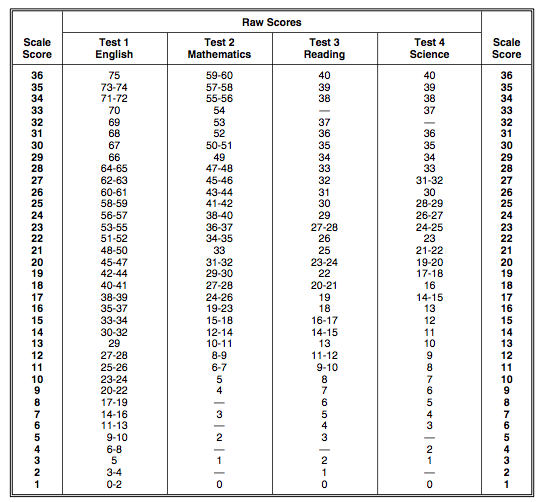
If you’re planning on taking the ACT, you’re probably wondering what you can expect in terms of scores. In this article, I’ll take you through the basics of how the test is scored, show you where your scores fall in relation to other students, and give you a few tips on how to plan your studying to meet your goals.
ACT Score Range: The Basics
On the ACT, your composite score can be anywhere from a 1 to a 36. Unlike the SAT, the composite score is not the sum of the scores of the other tests - it’s the average.
The ACT has four sections: English, Math, Reading, and Science. Each one is also scored on a scale of 1 to 36, and the average of these four scores will make up your composite score.
The ACT doesn’t have an incorrect answer penalty, so your raw score on each section is just the number of questions you get right. Any questions you answer incorrectly or omit will not count towards your score. English has 75 questions, Math has 60, Reading has 40, and Science also has 40.
Check out this sample conversion chart to see how raw scores are converted to the final scores on a scale of 1-36:

(note that different tests have different raw score to scaled score conversion charts, but this is generally the right idea).
The ACT also has an optional essay, but the Writing section will not impact your composite score or any of your test subscores. You will get a score from 2 to 12 on your essay in four different assessment categories. Your total Writing score will be out of 36 just like the other sections. The ACT gives you an English Language Arts (ELA) score as well, which is the average of your English, Reading, and Writing subscores, but again, this doesn’t factor into your final composite score.
Average ACT Scores
The national average composite ACT score for the class of 2014 was a 20. Average scores for subsections were:
English: 19-20
Math: 19-20
Reading: 20-21
Science: 20-21
If you’re scoring in this range, you’re already scoring higher than 50% of students who take the ACT and will have a good shot at getting into many colleges. Keep in mind, however, that national averages might not be the most relevant to your individual situation.
You should look up the average scores for schools you’re interested in to figure out what target score to shoot for. If you’re hoping to attend a very selective school, you might need to set your sights on a score in the 34-36 range. At MIT, for example, the 75th percentile composite ACT score for admitted students in 2014 was a 35. When you look at the averages for your school of choice, you should try and aim for the 75th percentile score (higher than 75% of admitted students) because it will give you the best chance of admission.
Also keep in mind that some schools want you to submit the ACT Writing score, and some don’t care about it. This is an important factor to take into account both when studying and when deciding whether to sign up for the ACT with or without Writing.
 MIT: A lush sanctuary where geeks can run free
MIT: A lush sanctuary where geeks can run free
Studying for Your Score Goals
You might know where you fall in terms of your ACT score range if you’ve already taken the test. If not, try out a practice test (with appropriate time constraints!), and see how you do. If you find that you still need to improve your scores quite a bit, don’t worry! If you come up with a solid study plan, you should be able to get them up where you want them to be by the time the test rolls around.
I’ll give some brief guidelines below about how long you should study for different point improvements. For more info check out our complete study plan for the ACT and a guide I wrote on how long you should study.
I’m Looking to Improve by 1-2 Points
This is a very doable goal, even if you start studying only a couple months in advance of the test. Improving 1-2 points should take around 20 total hours of studying. This means that if you study for about two hours every week for two months, you should be able to meet your score goals. If you want, you can even space out your studying for a few more months so you only have to devote an hour a week to ACT prep.
I’m Looking to Improve by 4 Points
This is a pretty significant improvement, so you’re going to have to put in a bit more time. A four point improvement usually means around 40-50 hours of studying. You could choose to start studying two months in advance and plan out five hours a week if you prefer longer, more intense study sessions. If you’d rather spread it out more, try studying for two hours a week for five or six months instead.
I’m Looking to Improve by 6 or More Points
This level of improvement is going to require a lot of hard work. For a score increase of six or more points, you’ll most likely need 150+ hours of study time. This means starting early and committing to study sessions every week. If you start studying six months before the test, schedule out five hours a week to devote to ACT prep.
You should also remember that your studying needs to be high quality in order for you to see results! This means figuring out what types of questions cause you problems and then practicing similar questions over and over. You'll have to take the time to really understand your mistakes before you start to see positive changes in your scores.
Summary
Here are some of the main points you should remember about ACT scoring:
- The ACT gives you a composite score on a scale of 1 to 36
- There are four subtests in English, Math, Reading, and Science, and each is also scored from 1 to 36
- These four tests are averaged to make up your composite score
- The average ACT composite score is around a 20 nationally
To figure out the score range you should be aiming for, look up the 75th percentile scores of admitted students for schools where you plan to apply. This will give you a better sense of how much time you should devote to studying. Even if the gap between your current scores and your goal is pretty large, with enough planning and focused studying, you should be able to beat the test!
What's Next?
ACT Score Choice and Superscoring are two policies that might impact which of your scores colleges see. Read more about what ACT Superscoring is here and what ACT Score Choice means for you here.
Still not sure whether you should take the ACT or the SAT? Learn more about which one is best for you.
For more information on ACT scores, read this article on how to get and interpret your results.
Want to improve your ACT score by 4+ points? Download our free guide to the top 5 strategies you need in your prep to improve your ACT score dramatically.
Have friends who also need help with test prep? Share this article!

Samantha is a blog content writer for PrepScholar. Her goal is to help students adopt a less stressful view of standardized testing and other academic challenges through her articles. Samantha is also passionate about art and graduated with honors from Dartmouth College as a Studio Art major in 2014. In high school, she earned a 2400 on the SAT, 5's on all seven of her AP tests, and was named a National Merit Scholar.


































 Holly R.
Holly R.